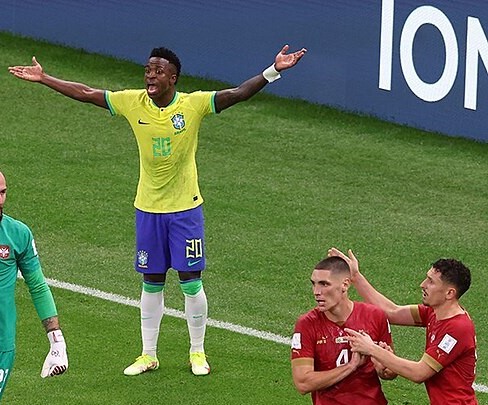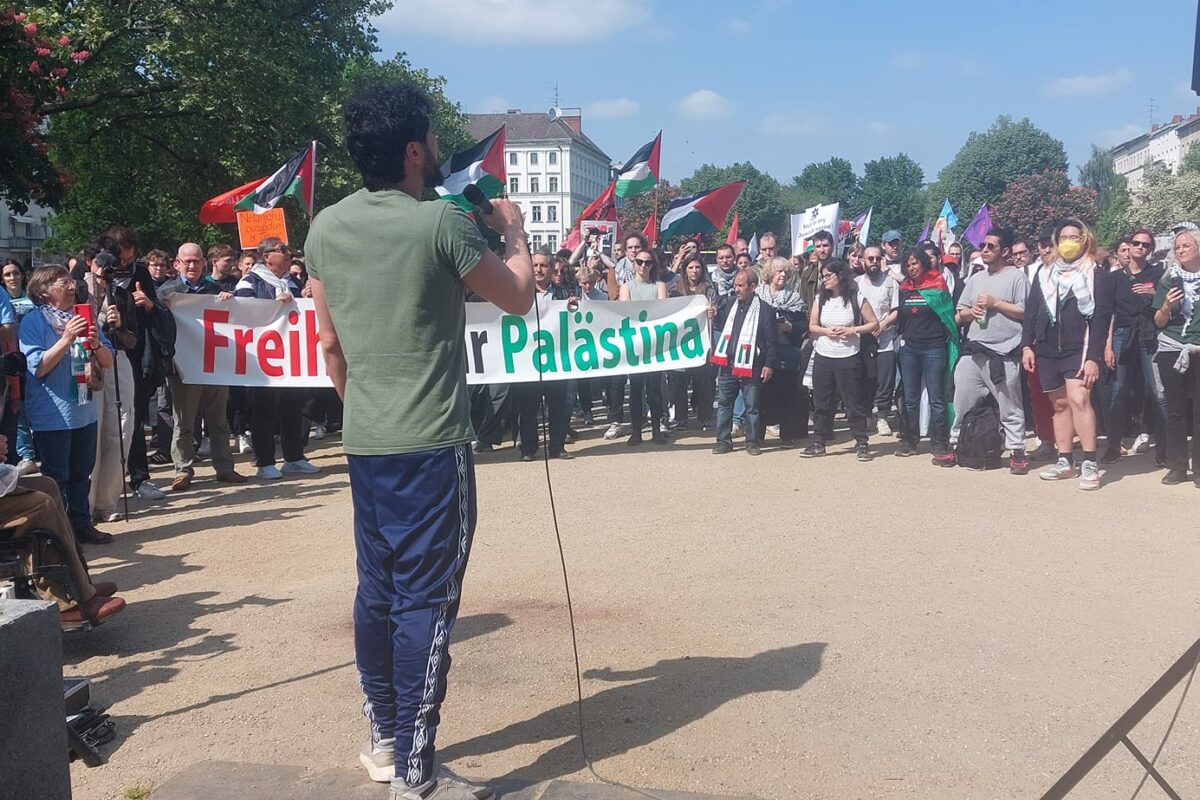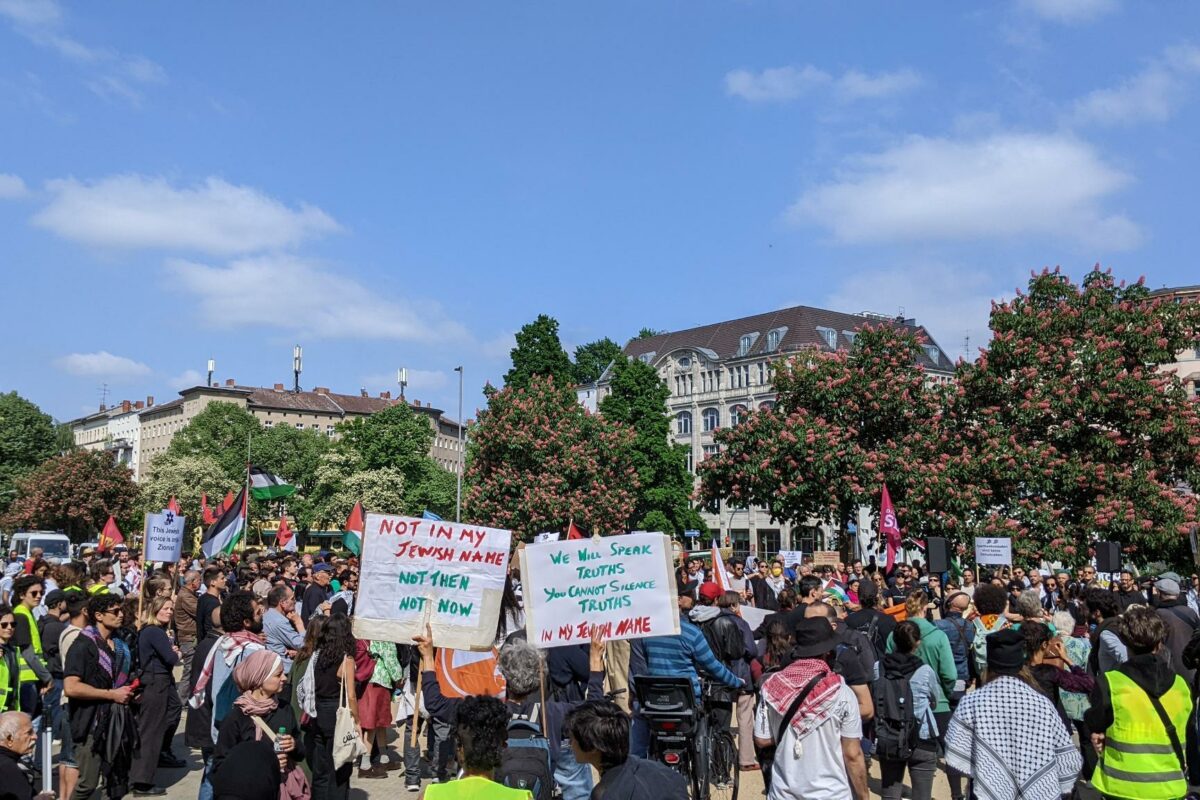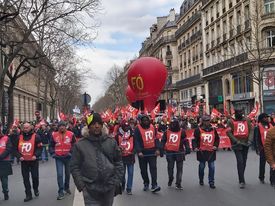Editors’ Note: Phil Butland and Helena Zohdi recently interviewed Hossam el-Hamalawy about the history of the Egyptian Left. Because of the length of the interview, we will be publishing it in several parts, The second part will appear soon on theleftberlin.
Hello Hossam. Could you start by introducing yourself? What is your political history, and what are you doing now?
My name is Hossam El-Hamalawy. I am an Egyptian journalist and photographer. I’ve been a member of the Egyptian Revolutionary Socialists since 1998. Initially, I started my political activism as an Arab nationalist, because that’s how I was raised and influenced by my family circle.
But in the 1990s, these were hard times for anyone who professed Arab nationalism. You had the Gulf War. We had American bases all over the Middle East. The American military presence predated that, but it had always been low profile. This was not something that the Arab states could brag about. And after 1991, the military presence became explicit.
Secondly, that’s when you had the Oslo peace process, between the Israelis and the Palestinians, which we Arab nationalists regarded as a big sell-out. These were very tough times for anyone who believed in Arab unity or had been raised with a particular interest in the Palestinian cause.
We’d like to talk about the roots of the Egyptian Left. Where should we start?
The history of Egyptian Communism in general is divided into waves, because each period did come and go like a ocean wave. The first wave started with the 1919 revolution. And it ended with a crackdown on the first Egyptian Communist Party in 1924 by the liberal, pro-independence government of Saad Zaghloul. He smashed the Communist Party and the trade unions. It was a massive onslaught.
The second Communist wave, which was probably the strongest in our history, started in the late 1930s. It reached its peak in the 1940s. For example, in 1946, one year following the end of World War II, Egypt experienced its largest strikes to date.
The strikes were economic, but also political. Workers were fighting to improve their living conditions and working conditions. But at the same time, they were calling for independence from British occupation. During the war, Britain had promised all their colonies and protectorates that if you stood with them, they’d grant independence after the war was over. And of course, the British were not keen on fulfilling their promises. This triggered the strikes.
At the time, the Communists played a central role in the strikes, but they were Stalinists who believed in two-Stages theory, which explained that it was not yet time to have a social revolution. We must first solve the national question; and the two goals are necessarily separate. In opposition to this, we Trotskyists believed that these goals go hand in hand. The theory of Trotsky’s permanent revolution answers these questions.
In his memoirs, Henri Curiel, one of the leading Egyptian Communists of the time, wrote that we found all the masses behind us, but we didn’t know where to lead them. This second wave basically ended in the mid-1960s with the Egyptian Stalinists dissolving their own organisation. They dissolved the Communist Party to join Nasser’s Arab Socialist Union.
This was a time when you had movements all over the Global South. You had African Socialism, Arab Socialism, the Cuban non-capitalist road for development. The Egyptian Communists argued that Egypt was heading down a non-capitalist path to socialism, and it was the duty of Communists not to organize independently, but to work with the regime to push this forward.
Can you say something about the Nasser regime? We’re not talking about Mubarak or Sisi. We’re talking about somebody who nationalised the Aswan Dam, somebody who was at least very vocally on the side of the Palestinians, so much so that Israel and Britain and France invaded Egypt. So we’re not talking about a regime which is thoroughly corrupt, but one in which you can quite understand why the Left had illusions in them.
The Nasser regime was like other radical Third World nationalist leadership groups at the time. You had an eclectic group of essentially nationalist officers staging a coup to take over the state apparatus, in the name of the people. The leaders started state capitalist projects to devolve industry and implement agrarian reforms.
This was not necessarily the plan from the beginning. Nasser and his comrades were more than happy to cooperate with the CIA following the coup. Our internal security organs were created and trained with the help of the CIA. Nasser presented himself to the United States as an anti-communist. Many Egyptian officers, who later would go on to take leading positions in the intelligence service and with other regime security organs, were first sent for training in the U.S.
Nasser was being pushed gradually into this left-wing, anti-imperialist position, which he did not necessarily hold. On the one hand, you had the Israelis bombarding the Americans with propaganda about Nasser being a closet Communist. On the other hand, Nasser wanted to proceed with economic development. And part of his development scheme at the time was the building of the high dam, which needed financing. He initially went to the Americans to ask for money. But then, the Tripartite Aggression happened, triggering the Suez Crisis.
When people credit Nasser with all these left-leaning reforms, it’s important to remember that one of the reasons why they happened was to calm a social situation that was evolving into a full-fledged revolution.
From 1946 onwards, you had waves of strikes engulfing Egypt, you had guerrilla warfare in Suez Canal cities. There were reports here and there in the countryside of peasants setting fire to mansions, or attacking their landlords.
On 26 January 1952, just five months before the coup, the Cairo fire engulfed the capital. This event was essentially an anti-British, anti-monarchy riot. There was also a mutiny by Egyptian police troops stationed in Cairo.
When you read Nasser’s booklet, the philosophy of the revolution – this is a booklet that he wrote after the coup and is his equivalent of Mao’s “Little Red Book” – you will find that he was expressing his concern amid the chaos as an army officer and a middle-class Egyptian. He was witnessing the country on fire, and a state about to collapse.
The coup reflected the escalating social situation on the one hand, and the goals of these national officers on the other hand, who sincerely wanted Egypt to develop to a point that would put them on the same level as other Western countries.
But they didn’t necessarily have a socialist vision. Some members of the Free Officers were Communists, but they were marginalised immediately following the coup – most infamously Youssef Seddik, who was actually credited with the success of the coup. Khaled Mohieddin, who later formed the El Tagammu (National Progressive Union) party in the 1970s, was also a Communist and he was marginalised.
Those who took the lead were mainly either centrists or right-wingers. One of the first acts of the revolution was the execution of the Communist workers who led the strikes in the Kafr al-Dawwar textile mill, south of Alexandria. The military tribunal that sentenced the workers took place inside the factory. It was a medieval scene.
And yet, despite all this, the Communist Party dissolved itself into the regime.
At the beginning, no. The Communists in the beginning were split between those who wanted to join Nasser from the start, partly because they were thrilled that some of their members were part of the Free Officers.
But others regarded it as a fascist, pro-American pro-CIA coup. You can excuse them for this. After all, the new regime executed Communist workers and opened negotiations with the Americans. They brought in the CIA to train their security cadres. Of course, the Leftists who saw this thought this is another Mossadegh, like in Iran.
But events in 1956 changed the rules of the game. When Nasser stood up to foreign powers amid the Tripartite Aggression, his popularity soared. He was regarded as an anti-imperialist leader. And rapprochement with the Soviets had started. Thus the Egyptian Stalinists argued that people should cease the criticism of Nasser.
However, the repression did not stop. The Communists were repressed in a series of bloody crackdowns. There were Communist martyrs who turned into icons because they died in prison. In an Orwellian kind of way, Shohdi Attiya el-Shafei, a prominent Communist leader, died in prison while he was chanting for Nasser.
Nasser and the Free Officers initially had legislated some economic reforms that encouraged private investment to step in and start aiding the development of an industrial base. Then with the Tripartite Aggression, Nasser initially went in and started to not exactly nationalise, but “Egyptianise,” British and other foreign assets.
And then when he expelled the Jews from Egypt after 1956 as part of a backlash against Israel’s involvement in the Suez crisis, he took that country’s assets and Egyptianised them too. He put them up for sale, for Egyptian investors to ideally step in. But they did not step in. Because as we say in Arabic, capital is cowardly. It doesn’t like instability. Who would be so crazy to invest in a country that’s so unstable? The Egyptian investors did not feel secure enough. So there was capital flight out of Egypt.
That’s when Nasser introduced the “July socialist resolutions” in 1961 and nationalised state industries, so that the state could start investing directly and pump in enough capital to create the massive industrial base that Nasser had envisioned.
Before we go on, let’s go back to the expulsion of the Jews. There’s an important discussion, especially in Germany. It’s the 75th anniversary of the Nakba. And you hear people saying: “the Palestinians were expelled in 1948. That was terrible. But Jews were also expelled from Arab countries. There are problems on both sides.” Can you compare the Nakba with the expulsion of Jews from Egypt?
First, in terms of scale and in terms of loss of life, what happened in Palestine did not happen in Egypt. It wasn’t a pogrom where forces went in and machine-gunned Jewish neighbourhoods in the cities. This is number one.
Number two is maybe a little bit more important. Israel itself was frustrated with the low level of migration of Arab Jews, whether from Egypt and Iraq and elsewhere, to its newly founded settler colonial state. So part of what they did in 1954 is something that was later called the Lavon Affair, in which Israeli agents in Egypt planted bombs in civilian areas. They were caught, and this was a big scandal.
There was definitely an element of anti-Jewish moral panic in Egypt during the Suez War. This is something we must be firm about. But interestingly, most of the Jews who left Egypt at the time didn’t go to Israel. For them, the “promised land” was the United States or Europe, and elsewhere.
The takeover of properties was not solely directed against Jews. This was part of a bigger crackdown on large capital holdings in Egypt – initially, property owned by foreigners. There are no mass graves of Jews in Egypt, there were no pogroms. But there was an element of hostility.
In 1961, with the July socialist resolutions, Nasser “stole” the Communists’ programme, the Egyptian state capitalist model. You can name it Arab socialism, you can name it African socialism, you can name it Soviet Communism. However, at the end of the day they are essentially the same project. So, the second Communist wave was over by 1964 and 1965.
So Arab nationalism is on the rise, the Communists dissolve themselves in 1961. What would you have suggested the Communists do differently?
The Communists should not have given up their organizational independence. They should have maintained their own organizations. They should have presented a left-wing critique of the Nasser regime.
So we have a state capitalist regime controlled by a militarised elite – that’s what got us into 1967 and the Six-Day War. That’s what led us to defeat. We lost, and you immediately saw a large number of Egyptian youths starting to become disillusioned with the Nasserist project. They started looking around for alternatives, but they didn’t find any Communist organizations. They blamed the Communists for selling out, and for not keeping their organizational independence. And for being part of the state bureaucracy.
I would not have stood against nationalisation, but I would have put forward the question of workers’ power. Yes, industry is nationalised, but who now runs production? Is it the workers? Or is it the bureaucracy? And in the case of Egypt, and the Global South in general, it was the state bureaucracies and the militarised elites.
You can subscribe to Hossam’s blog on contemporary Egyptian politics here.




